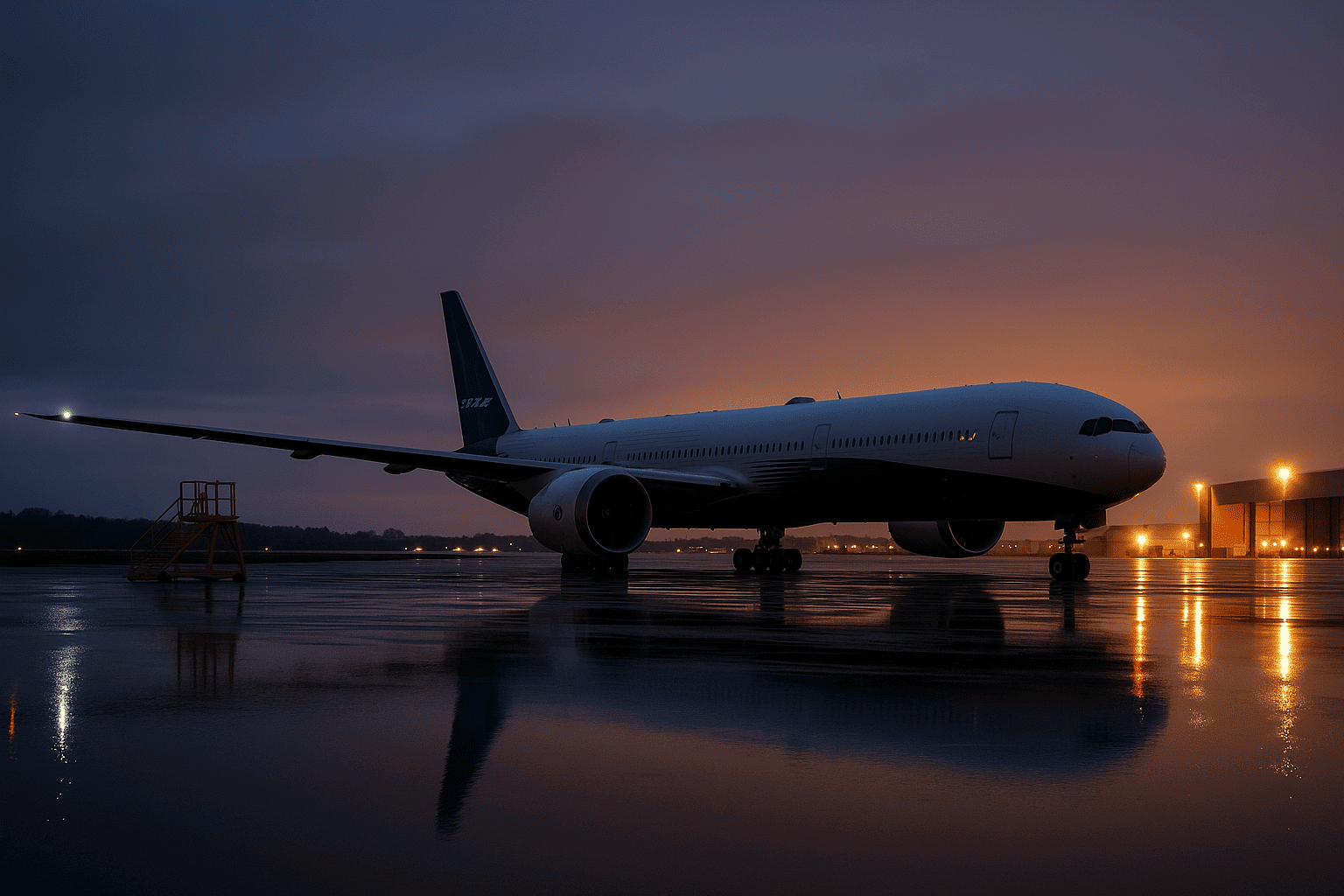Boeing Takes $5 Billion Hit, 777X Slips to 2027
By Tredu.com • 10/29/2025
Tredu

What changed and why it matters
Boeing said it will take a nearly $5 billion charge tied to the 777X and shift first delivery to 2027, extending the already long delay on its flagship widebody. The update lifts cumulative charges on the much-delayed program to roughly $15 billion and underscores persistent certification and production pressures. For investors, the Boeing takes $5 billion hit, 777X delayed to 2027 headline captures the financial weight and the strategic setback in a market where long-haul demand is recovering.
The new timeline
Recent reporting signaled slippage from 2026 into early 2027; the company’s latest move formalizes that delay. Airlines had already adjusted fleet plans around sliding delivery windows. Some, including launch customers, indicated they would re-sequence cabin retrofits and stretch existing fleets to bridge the gap. The shift pushes entry to service about 14 years after the program’s 2013 launch.
What the charge covers
The pre-tax hit, nearly $5 billion, reflects higher production costs, supplier support, and program accounting updates against a later delivery profile. Analysts expected a sizeable charge, but the magnitude topped many previews. The tally brings accumulated expenses on the 777X near $15 billion and raises the stakes on ramp discipline once certification clears.
Certification remains the pacing item
Management has said the 777-9 certification schedule is behind plan, even without new technical discoveries. The gating items are test completion, documentation, and regulator approvals. Until type certification milestones are locked, production plans and customer induction dates will carry a wider error band, complicating cash and delivery guidance.
Competitive backdrop: A350 gains room
Each 777X delay widens the lane for Airbus’s A350 family with long-haul carriers that need lift as international traffic normalizes. Several airlines have added A350 orders or conversions, citing earlier delivery confidence and fleet commonality. If Boeing holds the 2027 date and stabilizes the ramp, the 777X can still slot into replacement waves later in the decade, but the near-term share tilt favors Airbus.
Airline patience and compensation risk
Airlines typically negotiate compensation for delays that push aircraft beyond contract windows. Another slip raises the probability of credit, support, or schedule relief to preserve relationships. While many customers remain committed to the 777X for capacity and range, prolonged uncertainty can trigger incremental deferrals or swaps. The company must balance program economics with customer support to avoid further erosion of goodwill.
The rest of the house: green shoots and offsets
Outside the 777X, Boeing reported signs of operational recovery: an improved delivery cadence, stronger quarterly revenue, and positive free cash flow, albeit alongside a larger adjusted loss per share. The 737 program earned approval to lift output and posted its best monthly delivery tally since 2018, helping working capital. Those offsets cushion, but do not erase, the widebody drag. Execution on near-term programs is now a key source of liquidity while the 777X remains a cash consumer.
Cash flow, backlog, and balance sheet lens
Quarterly free cash flow turned positive, yet the 777X charge and later deliveries extend the payback horizon. Investors will focus on contract assets, advance balances, and inventory tied to the 777X, plus any supplier financing. The broader commercial backlog remains deep, which supports medium-term cash once reliability and certification timelines firm. The task is to bridge to that point without diluting returns or stressing the balance sheet.
What success looks like from here
Three signposts can rebuild confidence. First, visible progress on certification gates that translate into credible test and approval milestones. Second, a disciplined production plan that avoids out-of-sequence work and protects unit cost as the ramp begins. Third, steady communications with key customers on induction, training, and service-entry readiness. Meeting those marks would reduce the risk of another reset and keep 2027 delivery targets intact.
Risks that could force another reset
Supplier capacity, documentation quality, and regulator bandwidth are the known risks. Powerplant and systems integration are always watch-points on new widebodies. A slower-than-planned certification burn-down, or unexpected rework, could push cash inflections further right. Macro softness that hits long-haul yields would add pressure, though current international trends remain constructive.
The broader industry read-through
For airlines, scarcity of new widebodies can support yields, but schedule volatility complicates network plans. For suppliers, the delay shifts revenue timing and may require temporary support. For Airbus, momentum in the A350 line reinforces bargaining power with carriers seeking near-term lift. For Boeing, stabilizing the 737 and other franchises buys time to land the 777X safely. The strategic prize remains large aircraft with lower fuel burn and range, but the path depends on certification cadence.

How to Trade Like a Pro
Unlock the secrets of professional trading with our comprehensive guide. Discover proven strategies, risk management techniques, and market insights that will help you navigate the financial markets confidently and successfully.


